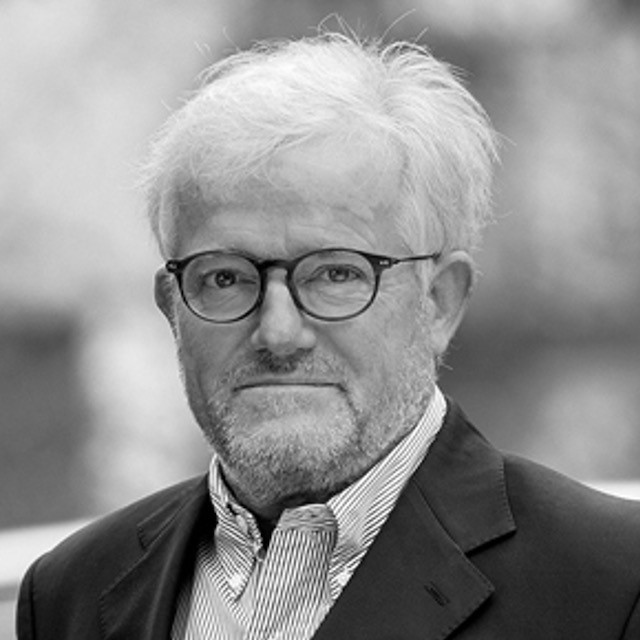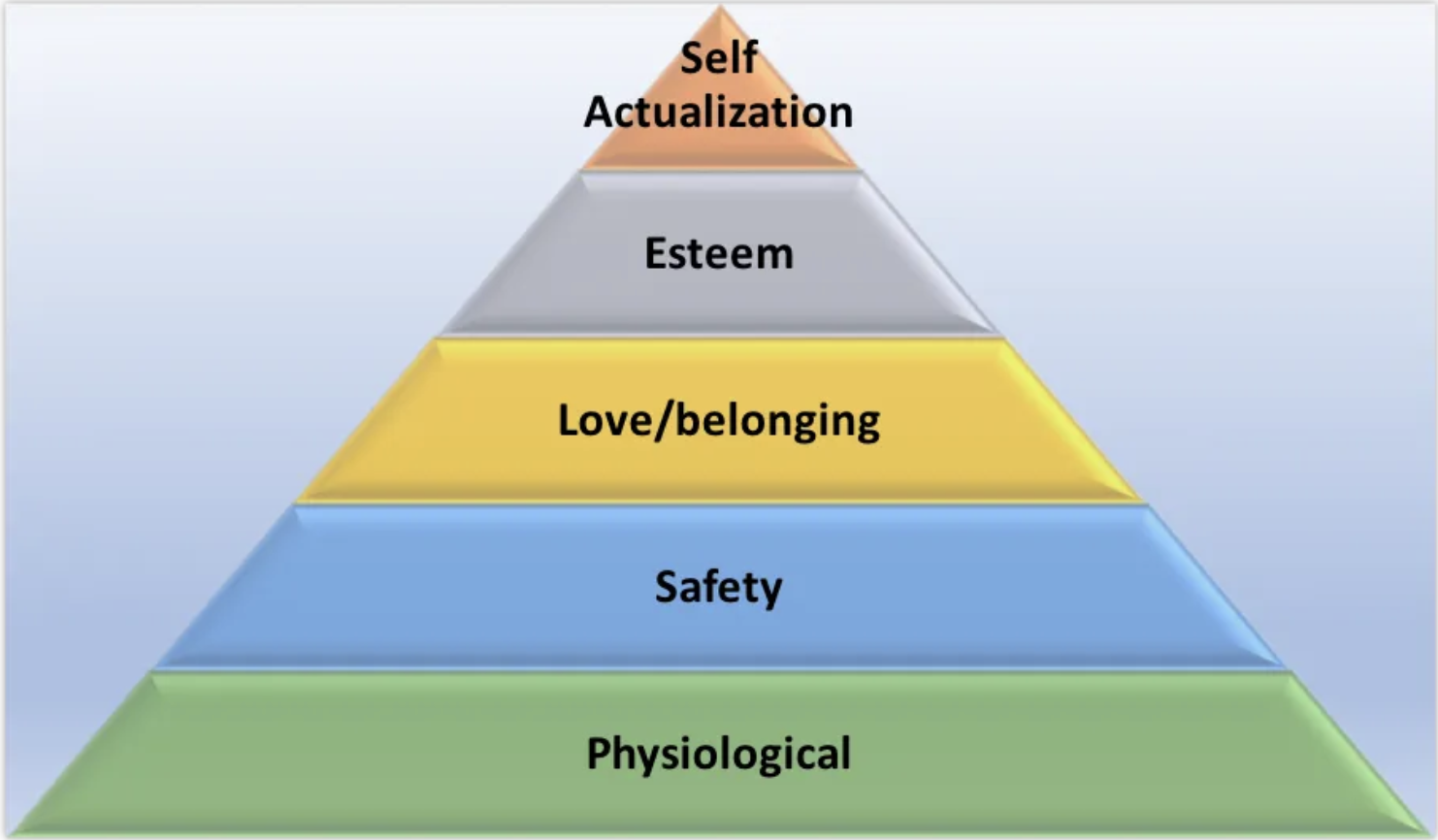Raymond Schadeck, a member of our International Advisory Board asks “To have and to be: what if we inverted our values?”

In my last article, when referring to Maslow’s famous pyramid of needs I noted that in this period of crisis, basic primary needs tend to regain in importance at the expense of other more material and ancillary needs. I also expressed my hope that the moral reappreciation of certain professions, which have become the keystones of the management of this crisis, could serve as the basis for a thorough re-assessment of the real impact of all professions in our society and respective adjustments in remunerations.
A utopia ?
These two ideas, at first sight seemingly foreign and separate, in my opinion indeed should be directly correlated and complementary.
Maslow’s pyramid of needs
Abraham Maslow was an American psychologist best known for his “hierarchy of needs,” which he elaborated in his 1943 paper “A Theory of Human Motivation.” In his model, Maslow postulates that individuals are motivated by five different levels of needs:

The bottom four levels are also referred to as “deficiency needs” as they arise from a lack or deprivation of something, while the highest level of self-actualization is referred to as a “growth need,” something we aspire to.
Maslow discovered that even though all of these needs are present within us at all times, we might feel some more strongly than others. In fact, the most basic needs must be met – at least partially – before progressing on to higher level needs. For example, it is only when our basic needs for food and shelter are mostly met that we might orient our energy towards the more psychological needs of belonging and esteem. He also proposed that while every person has the potential to move up the hierarchy, this doesn’t always happen in a straight path. As we’ve all undeniably been experiencing lately, different life experiences will see us fluctuate between different levels of the pyramid. And the turmoil we are presently facing makes us all become much more driven again by deficiency needs – needs we thought we had well-covered.
We refocus on deficiency needs
Despite this reorientation towards more basic needs, I dare to hope that we will be able to appreciate today, at its fair value, the enormous privilege we have in Luxembourg to be able to continue to have our physiological needs (food, water, air) met despite the crisis, thanks to the continued effort of farmers, truckers, delivery people, restaurant workers, storekeepers and cashiers who are going above and beyond.
But I also hope that we will know to be more sensitive to the magnitude of distress of all those people who are not as fortunate as us. In fact:
- more than 90% of the world’s population live in areas with levels of air pollution that exceed the World Health Organization’s limits, and seven million people die from air pollution every year;
- the French Observatory of Inequalities reports that 10% of the worldwide population, roughly 800 million people, are affected by malnutrition (insufficient intake of calories for a healthy life);
- 2.1 billion people (more than 20% of the world population) lack, per United Nations statistics, access to drinking water – even though such access is officially considered a fundamental right.
The second level
Our serenity with regard to the first level of physiological needs seems to fade as we progress to the second level, the safety needs (shelter, personal safety, job security, mental and, above all, physical health…). Until recently, safety, too, was a need we took for granted with all the public protection and support schemes in place (the right to housing, physical safeguard systems, social benefits and unemployment systems, social security, etc.), assets for which the main responsibility fell to the public authorities.
Yet here we are, suddenly realizing that these assets are no longer a sure thing and that, collectively and in full solidarity, we also have a crucial role to play in all of this. And that in the long run, even the protection systems we still have in place risk being overwhelmed. Concerns about housing, job and income security and, most of all, physical and mental health and well-being are destabilizing us while we continue to face the daily fear of an unknown future as we remain, for the time being, “sheltered in place.”
Again, assuming that we remain privileged and safe despite our confinement, I dare to hope that this will make us:
- truly assess the relatively favorable situation we are in compared to the 1.6 billion people — approximately 20% of the global population –who even before this crisis lacked adequate shelter and the 100 million homeless who have no shelter whatsoever;
- truly realize the terrible and extreme confinement conditions of the 12% of the world population (of which 350 million are children) that currently lives in war zones;
- not forget the hundreds of millions of women who are confined at home for cultural and/or religious reasons…
- …or the victims of domestic violence whose safety is in complete jeopardy as they find themselves currently confined with their abusers. Sadly, the number and severity of such “intimate terror” have spiked in the conditions created by the pandemic. According to the National Coalition Against Domestic Violence (NCADV), nearly 20 people per minute are physically abused by an intimate partner in the United States alone;
- really see the 30 million refugees who for reasons of war, drought, and famine are seeking nothing else than a minimum of safety. And why not even go a step further and open our doors to them in an effort of solidarity? Why not prompt our governments, our corporations and ourselves to do everything possible to help countries that are worse off than ours, where refugees will continue to flee from, now and in the future? Help them find local and effective solutions to the problems that are threatening their basic needs. As one of my best friends, Dr. Ravi Fernando, explains it: “Even if we reach the 2°C target, climate change will, according to the latest forecast, generate a flow of 143 million additional refugees between now and 2050 (more than 85% coming from Africa and South Asia). So we need to realize that unless we help them solve their problems locally, their problems will very soon become our problems, too.” So, better act proactively now than face an even bigger problem in a couple of years.
The third level
So, with our physiological needs fully met and our safety needs at least partially met, one positive evolution that stands out is that we are more than ever realizing how deeply we carry the need for love and belonging within us. Surprisingly, the very technologies that we feared would ruin some deeper aspects of our family lives and friendships, have proven themselves to be beneficial, even essential, to uphold and further develop these very same relationships. This heightened sense of solidarity shouldn’t come as a surprise, however, as time and history have shown us over and over again that in times of crisis, people come together and collaboration and support become the drumbeats of everyday life.
As we cherish these newfound connections to our families, let’s hold on to them as tightly as we can, realizing how lucky we still are while we take a moment to:
- remember the more than 100,000 people we have already lost to this virus: grandmothers, grandfathers, mothers, fathers, sisters, brothers, children — people who, just like us, have families, many of which didn’t even get the chance to say goodbye to them;
- think about all the families that are being broken up due to wars and immigration;
- send our love to all the people who currently feel alone and isolated.
The fourth level
Even the esteem need, i.e. the esteem for oneself, the desire for reputation or respect from others, seems to be experiencing substantial shifts. As just mentioned, we certainly have rediscovered the real value of our family and close friends and repositioned them at the center of our lives. They are there when we really need them; they are the ones we appreciate and love unconditionally — those whose esteem and respect is worth a thousand times more than that of countless superficial friends on our social networks.
And I dare to hope that the real winners of this shift in perspective are our kids for whom, according to Maslow, this need of esteem and confidence is even more crucial. They now benefit from a greater attention and presence from their parents, despite the real difficulties that these cohabitations can pose in terms of maintaining our professional duties and their school activities.
Over the last weeks, many people have had, by necessity, plenty of time for themselves. Some of us seem to try to seize this time as an opportunity: going for walks, resuming physical activity, reading, meditating, practicing self-care, rediscovering some of our passions and by doing so, experiencing some newfound sense of self-worth and esteem, maybe even finding some dignity in all of this. Yet, while for some lucky ones among us this new connection to self and others lets us indulge in a feeling of accomplishment and confidence, let’s not forget to honor the struggle of:
- the 264 million people of all ages globally who suffer from depression and for whom this isolation has been punishing, exacerbating already existing psychological challenges;
- the 284 million people in the world who have anxiety disorders;
- the new people at risk of this same depression and anxiety and for whom this experience has been traumatic;
- People who lost their jobs
Suicide hotline calls have spiked and some officials warn that this current crisis could prompt a second one — a mental health crisis. The longer this pandemic persists, the longer the confinement, the greater the economic toll, the graver the detriment to our mental health and the longer its effects.
I dare to hope that we will realize that our mental health is just as important as our physical health and start giving it the attention and resources it deserves.
The fifth level
The self-actualization need, i.e. the need to reach our fullest potential, seems to be on standby for now. Given the urgency and destabilization of our primary needs and, following the logic of Maslow’s theory, the desire to fulfill our personal potential is no longer our priority. The mad rush for more visibility and recognition has stalled. And maybe that’s for the best.
In summary, the present turmoil is prompting us to refocus on our basic or, one might, existential needs. We are finally caring much more about our personal well-being and that of our loved ones – with an exemplary solidarity that we thought had disappeared – and much less on our “well-having,” which had as its major goal to impress others. Just comparing the messages and posts on social media that circulated before the crisis to the ones we read now makes it clear that “to be” has definitely taken priority over “to have.”
Let’s just hope that this will last.
As many people have stated in different ways: “People were created to be loved, goods are produced to be used.” I dare to hope that after this crisis we will finally stop doing the opposite.
You will understand that it may soon be time to consider the utopia I dare to hope for as a real possibility and to recalibrate the importance of the roles of each person in our society with regards to our most basic needs. Applauding our helpers at 8 p.m. is a tremendous start, yet I dare to envision a standing ovation that lasts well into the future.
(N.B. – Big thanks to you, Julie and Felix, for your support)

